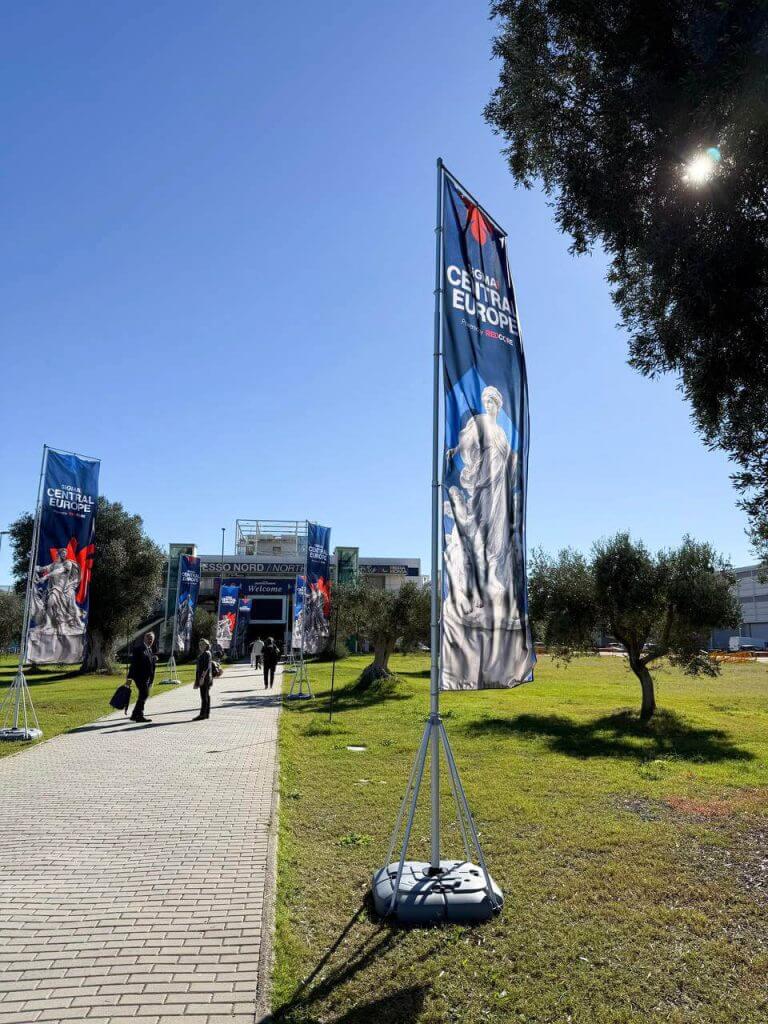SiGMA Central Europe: Quality at the Heart of iGaming Expansion
by Oleksii Tkachuk | November 20, 2025 10:39 am
As more and more previously conservative countries allow iGaming, events like SiGMA Rome become true hubs for discussing best entry practices. Our team was right in the middle of it, exploring the latest regulatory shifts and technical trends. From casual hallway meetings with developers to in-depth discussions about compliance challenges, here’s what we learned at one of Europe’s most dynamic gaming conferences.
Our Team at SiGMA
We had two delegates in Rome helping people navigate quality:
- Tetiana Avramova[1] – Key Account Manager
- Anastasiia Kushnir[2] – Program Manager


How SiGMA Met Us
SiGMA Central Europe 2025 took place November 3-6 at Fiera Roma, bringing together gaming operators, game providers, platform developers, and technology vendors from across Europe and beyond. The venue offered some memorable touches, like the badge pickup area styled as a jungle-themed oasis, which made for a unique start to the conference.
Exhibitors also got creative with their booths. One of them went all-in on the Roman theme with live boxing matches – both men and women competed in rounds throughout the event, surrounded by antique columns and staff dressed as Roman soldiers. It was quite the spectacle and definitely caught attention as we entered the hall.
While the showmanship was impressive, the real value for us was in chance hallway encounters that happened while we were navigating between pavilions. We treat these as a crucial reminder: conferences aren’t just about scheduled meetings and exhibitor booths. Networking between attendees without stands is even more important, as it carries genuine business energy. And even though the event took place only a month after the SBC Summit (read our impressions at this link[3]), it felt fresh and was packed with valuable insights.
Sustaining Quality While Scaling
As iGaming becomes more accepted across previously restrictive countries, further expansion is what’s on people’s minds. However, potential growth requires huge focus on quality. Key talking points included compliance, traffic surges, compatibility, and fraud prevention. Companies without established testing were curious how it would influence their current approach. Those who had internal QA teams often asked about automation and process audits.

Scaling into newly regulated markets creates complex quality tasks. As a single platform needs to address a variety of different regulations simultaneously, all while maintaining consistent performance and user experience, the most common questions we were asked all revolved around compliance. The topic was also covered multiple times at panels. Sessions like “Grey to Gold: Jurisdictional & Compliance Challenges” and “North American Gaming Regulation in Focus” emphasized how companies must adapt to evolving regulatory developments across multiple markets.
Mobile-First Quality
It’s safe to say that iGaming is a mobile-first industry. For example, in Italy, 85% of gaming happens on smartphones or tablets. This further highlights the importance of optimizing for handheld. QA teams must prioritize mobile testing frameworks that ensure seamless functionality across devices and operating systems.
Each play and every bet starts with an impulse, and any inconsistency or delay leads to churn. With the majority of players accessing platforms through smartphones, any mobile performance issues directly impact revenue and retention. Our testing services[4] help you ensure coverage of varying network conditions, device specifications, battery consumption, touch interface responsiveness, and other crucial factors.
The Rise of AI-Driven Tailored Experiences
The industry is clearly using AI to create more individualized player journeys in compliance and safety. We’re seeing a shift toward automated, AI-driven identity verification, caused by strict anti-money laundering (AML) and know your customer (KYC) regulations. Operators now use biometrics to accurately verify a player’s identity in seconds, providing a personal and low-friction entry point for legitimate users.


This individual focus continues with responsible gambling, where instead of applying blanket rules, operators now use machine learning to monitor personal player behavior. This tailored approach allows systems to identify at-risk patterns and intervene in real-time. Both trends show a clear move toward managing the player experience on a one-to-one basis, creating new QA challenges in validating the accuracy of these automated systems.
Summarizing
SiGMA Central Europe 2025 clearly showed the current direction for the iGaming industry as it expands into opening regions. The event confirmed that quality assurance isn’t just a technical option, but a strategic need as companies implement new practices and deal with new regulations. Those who can establish robust testing, comprehensive compliance validation, and proactive quality management will have a significant edge.
Based on our conversations, several key insights emerged:
- Expansion to emerging countries requires QA strategies that can adapt to multiple regulatory frameworks without compromising quality or time-to-market
- Mobile optimization with a focus on device and performance testing is a must for the majority of countries
- Automation must extend beyond functional testing to include compliance monitoring, identity verification, and player protection systems
- Testing process audits[5] are increasingly valuable as companies seek to demonstrate regulatory adherence and quality standards to regulators
What we appreciated most were the insights shared directly by the teams. What bothers them as they scale. Whether discussing traffic management during major sporting events, fraud detection accuracy, or mobile performance, conversations consistently circled back to the fundamental question: how do we maintain quality while growing rapidly?
If you’re interested in discussing how QA can support your expansion into new markets, reach out to us[6]. And be sure to follow us on LinkedIn[7] – it’s the easiest way to stay up-to-date with us!
 [8]
[8]Learn more from QATestLab
Related Posts:
- Tetiana Avramova: https://www.linkedin.com/in/tetiana-avramova-%F0%9F%94%9C-sigma-31811727a/
- Anastasiia Kushnir: https://www.linkedin.com/in/anastasiia-kushnir-b5084a366/
- at this link: https://blog.qatestlab.com/2025/10/02/sbc-summit-2025-automation-in-igaming-and-betting-niches/
- testing services: https://go.qatestlab.com/3LTDF7S
- Testing process audits: https://go.qatestlab.com/43An8Mk
- reach out to us: https://go.qatestlab.com/4icwaVF
- LinkedIn: https://go.qatestlab.com/3XFncqu
- [Image]: https://go.qatestlab.com/4icwaVF
- ICE Barcelona 2026: Between Poker Wins and Talks on QA in iGaming: https://blog.qatestlab.com/2026/02/03/ice-barcelona-2026-between-poker-wins-and-talks-on-qa-in-igaming/
- Software Quality Trends in 2026: Key Changes Shaping Modern QA: https://blog.qatestlab.com/2025/12/24/software-quality-trends-in-2026-key-changes-shaping-modern-qa/
- Compliance Testing in iGaming: 5 Common Mistakes and How to Avoid Them : https://blog.qatestlab.com/2025/10/09/compliance-testing-in-igaming-5-common-and-how-to-avoid-them/
Source URL: https://blog.qatestlab.com/2025/11/20/sigma-central-europe-quality-at-the-heart-of-igaming-expansion/

